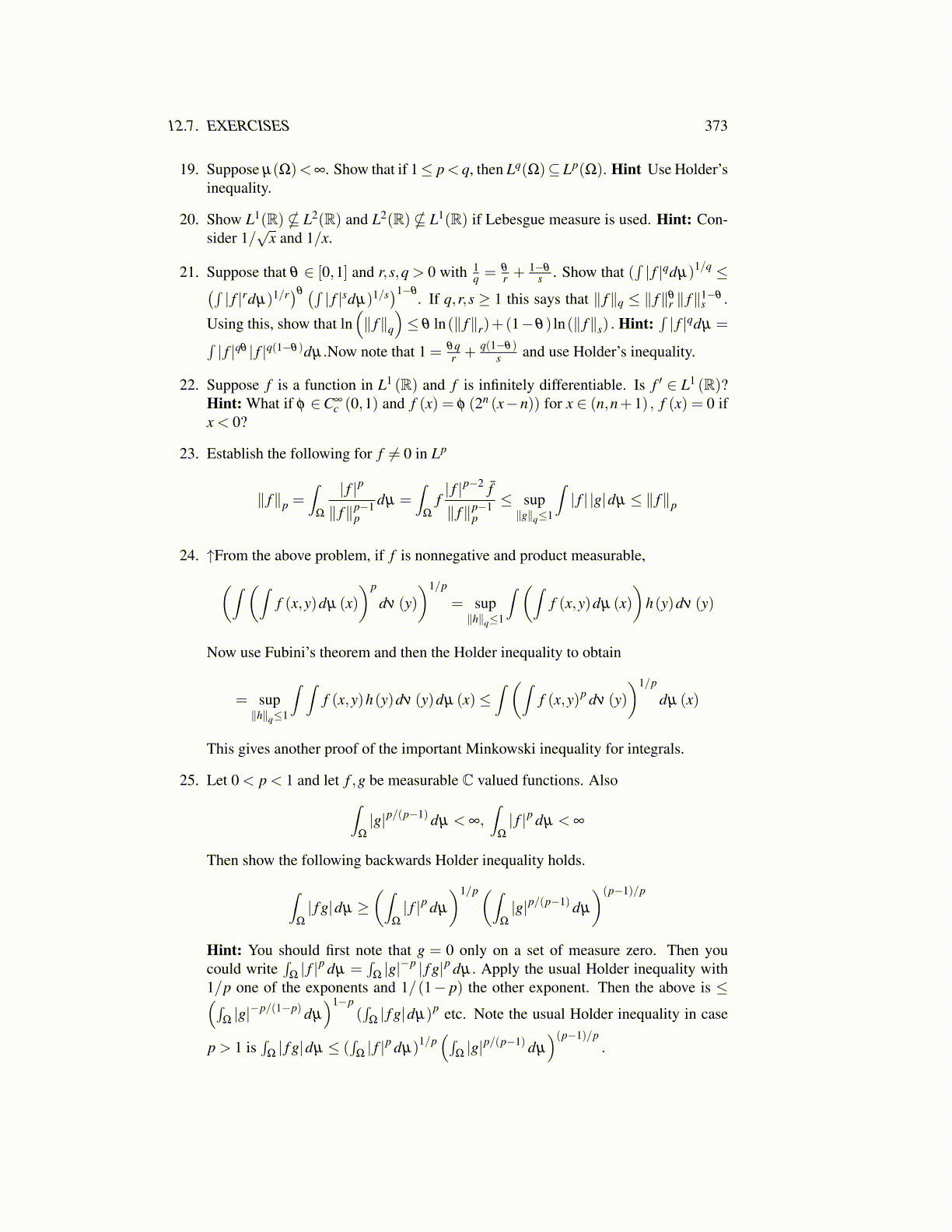
12.7. EXERCISES 373
19. Suppose µ(Ω)<∞. Show that if 1≤ p< q, then Lq(Ω)⊆ Lp(Ω). Hint Use Holder’sinequality.
20. Show L1(R)⊈ L2(R) and L2(R)⊈ L1(R) if Lebesgue measure is used. Hint: Con-sider 1/
√x and 1/x.
21. Suppose that θ ∈ [0,1] and r,s,q > 0 with 1q = θ
r +1−θ
s . Show that (∫| f |qdµ)1/q ≤(∫
| f |rdµ)1/r)θ (∫ | f |sdµ)1/s
)1−θ. If q,r,s ≥ 1 this says that ∥ f∥q ≤ ∥ f∥θ
r ∥ f∥1−θs .
Using this, show that ln(∥ f∥q
)≤ θ ln(∥ f∥r)+(1−θ) ln(∥ f∥s) . Hint:
∫| f |qdµ =∫
| f |qθ | f |q(1−θ)dµ.Now note that 1 = θqr + q(1−θ)
s and use Holder’s inequality.
22. Suppose f is a function in L1 (R) and f is infinitely differentiable. Is f ′ ∈ L1 (R)?Hint: What if φ ∈C∞
c (0,1) and f (x) = φ (2n (x−n)) for x ∈ (n,n+1) , f (x) = 0 ifx < 0?
23. Establish the following for f ̸= 0 in Lp
∥ f∥p =∫
Ω
| f |p
∥ f∥p−1p
dµ =∫
Ω
f| f |p−2 f̄
∥ f∥p−1p
≤ sup∥g∥q≤1
∫| f | |g|dµ ≤ ∥ f∥p
24. ↑From the above problem, if f is nonnegative and product measurable,(∫ (∫f (x,y)dµ (x)
)p
dν (y))1/p
= sup∥h∥q≤1
∫ (∫f (x,y)dµ (x)
)h(y)dν (y)
Now use Fubini’s theorem and then the Holder inequality to obtain
= sup∥h∥q≤1
∫ ∫f (x,y)h(y)dν (y)dµ (x)≤
∫ (∫f (x,y)p dν (y)
)1/p
dµ (x)
This gives another proof of the important Minkowski inequality for integrals.
25. Let 0 < p < 1 and let f ,g be measurable C valued functions. Also∫Ω
|g|p/(p−1) dµ < ∞,∫
Ω
| f |p dµ < ∞
Then show the following backwards Holder inequality holds.
∫Ω
| f g|dµ ≥(∫
Ω
| f |p dµ
)1/p(∫Ω
|g|p/(p−1) dµ
)(p−1)/p
Hint: You should first note that g = 0 only on a set of measure zero. Then youcould write
∫Ω| f |p dµ =
∫Ω|g|−p | f g|p dµ. Apply the usual Holder inequality with
1/p one of the exponents and 1/(1− p) the other exponent. Then the above is ≤(∫Ω|g|−p/(1−p) dµ
)1−p(∫
Ω| f g|dµ)p etc. Note the usual Holder inequality in case
p > 1 is∫
Ω| f g|dµ ≤ (
∫Ω| f |p dµ)1/p
(∫Ω|g|p/(p−1) dµ
)(p−1)/p.